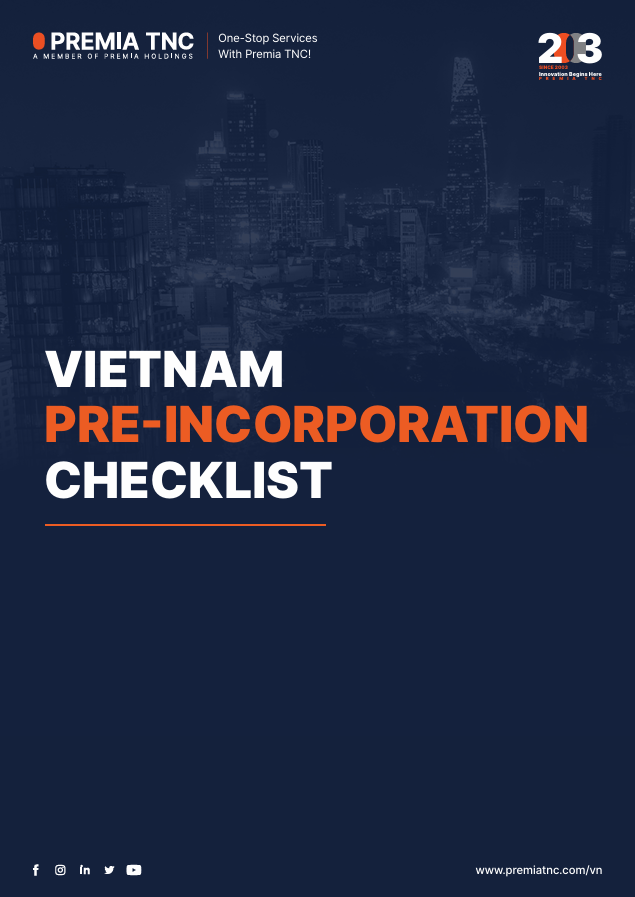

The numerous investment prospects in Vietnam are as perennial as the grass in the business world. And this is especially true for investors and aspiring entrepreneurs looking to do business in Southeast Asia. As a result, the business registration certificate in Vietnam is a must for all to understand.
Businesses have seen tremendous growth in the past months with the pandemic slowing down. Now, Vietnam can once again resume its economic robustness that started long before COVID 19. Even the World Bank has noted that Vietnam’s move to free enterprise has changed the once-upon-a-time emerging country into a minor middle-income global country.
Vietnam’s ERC or Enterprise Registration Certificate
Today, Vietnam is among the most active emerging countries in East Asia. So naturally, it attracts businesses and investments, making it imperative for people to understand the essential Vietnamese business registration options. Getting a business registration certificate in Vietnam is necessary for all planning to launch a company in Vietnam. This certificate proves that the business is formed on the record in Vietnam and duly approved by the government. In addition, if the business has foreign investment, the company needs to get an investment registration certificate ahead of the enterprise registration certificate.
Business Registration Certificate in Vietnam: Who Needs It and When It’s Required
Mandatory for All Legal Entities
A business registration certificate in Vietnam is essential for all businesses wishing to operate legally within the country. This includes entities that are fully Vietnamese-owned as well as those with foreign investment. The certificate serves as official confirmation that a company has been properly registered and is authorized to conduct business activities.
Foreign-Owned Companies and Investment Procedures
For companies with foreign investors, the process begins with acquiring an Investment Registration Certificate (IRC), which outlines the scope and conditions of foreign investment. Only after this step can the enterprise proceed to apply for the Business Registration Certificate, also known as the Enterprise Registration Certificate (ERC).
Issuance Authority and Legal Significance
The certificate is issued by the Department of Finance (DOF) in the province or city where the business is based. Without this document, a company cannot legally sign contracts, open a corporate bank account, or engage in commercial transactions. It is a foundational requirement that confirms the legal identity and legitimacy of a business under Vietnamese law.
4 Key ERC requirements for Business Registration Certificate in Vietnam
Of course, a business to get a business registration certificate in Vietnam upon satisfying specific conditions. The government of Vietnam promulgated some regulations, which governs enterprise registration in the country. This law also allowed applications for enterprise registration online with the following prerequisites as follows:
- Enterprise registration applicants must provide records and documents that fully contain vital information as required for written records and documents, but in electronic form. These required papers include:
- Notarized legal documents, such as Passport or ID Card of the legal representative(s) for corporations
- Incorporation Certificate, Constitution or Charter
- Registration forms as requested;
- MOU or Lease Contract for the company head office and landlord documentation;
- The electronic documents’ names must be the same as the hard-copy documents and must be scanned physical signatures;
- As in actual documents, the applying company must submit complete and accurate business registration data on Vietnam’s enterprise registration data portal. Moreover, it must include the electronic emails and phone numbers of the applicants; and,
- Validation must be done through the business registration (BR) accounts of those authorized to confirm applications, including their qualified people.
Business Registration Certificate in Vietnam: 3 Common Registration Hurdles
1. Address and Office Compliance Issues
If the address is located in an area not zoned for commercial use, or if the lease agreement is not properly aligned with the registration documents, authorities may reject the application. Ensuring that the company’s office space meets legal and zoning requirements is critical.
2. Document Legalization and Translation Delays
Foreign-issued documents, such as passports or company certificates from abroad, must be legalized and officially translated into Vietnamese. These translations must also be notarized locally to be accepted. Delays often occur when applicants fail to meet these procedural standards, causing longer processing times or outright rejection.
3. Business Name Conflicts
Another common obstacle involves the selection of the company name. Names that are identical or confusingly similar to those of existing entities are not permitted for registration under Vietnamese law. Applicants should conduct a name search in advance to avoid duplication and ensure that the chosen name complies with legal guidelines.
Vietnam’s ERC Procedure
The business registration application procedures for Vietnam’s enterprise registration certificate follow the mandates of specific law. From the application submission date for an enterprise registration certificate, the competent government authority must consider its approval within three working days.
In cases where the dossier exists invalid, the applicant is notified formally of what contents need amending or supplemented. If on hand is a denial to give a business registration certificate in Vietnam, the applicant is notified formally with its reasons.
Business Registration Certificate in Vietnam: Post-Issuance Responsibilities
1. Tax Code Registration
Once the Business Registration Certificate is issued, the company must register for taxation purposes. This included submitting initial tax registration forms to local tax office within ten business days of receiving the certificate.
2. Public Disclosure Requirements
The law also mandates that businesses publish their registration information on the National Business Registration Portal within thirty days. This transparency measure allows regulatory bodies and the public to verify business legitimacy and activity.
3. Operational Display and Seal Registration
Enterprises are required to have their official seal, which will be used on contracts and legal documents. If the company operates in a regulated industry, it must also apply for the necessary sector-specific permits before starting operations.
4. Ongoing Compliance Obligations
Failure to fulfill these post-registration obligations can result in administrative penalties or suspension of business activities. To avoid these risks, businesses should act promptly and remain diligent about meeting all legal responsibilities following registration.
How PREMIA TNC Can Help
PREMIA TNC helps foreign and local business people register their Vietnam companies. Our corporate launching and licensing facilities are designed based on simple and hands-on advice, with well-defined processes from the get-go to finish.
We guide venture capitalists through Vietnam’s government requirements with a team of experts. In addition, we remove the confusion in the process by providing transparency for what may otherwise be a drawn-out process of starting an enterprise in Vietnam. Hence, our commitment is to establish a Vietnamese company ready for operation. The investor doesn’t need to stay in Vietnam during the company registration or incorporation. We take pride in having a team who can prepare and send required documents for signing and mailing for our filing.
With our professional legal knowledge and experience in handling Vietnam Company Incorporation, we always strive to offer our clients one-stop services in foreign-owned company establishments. Finally, based on our expertise and extensive company insights, our team assists customers in entry advice and market research, establishment, operation, management, restructuring, organization, and implementation of their business and investment projects in Vietnam. So naturally, PREMIA TNC always seeks to understand each customer’s demands and desires to bring benefits to them in any circumstances.
FAQs
Is the business registration process unlike for firms with a Vietnamese partner?
No, Vietnam's business registration procedure is uniform for companies having a foreign partner.
We plan to name our branch Thien Thanh One Member Limited Liability Company – Dai Phat Company Branch. Is the scheduled branch name suitable?
The law’s provision state that:
• Names of representative offices, branches, and commercial locations shall follow the rules of law;
• On top of the Vietnamese name, a representative office, branch, or commercial location of the enterprise may put in the word in a foreign language, besides having abbreviated names; and,
• The proper name for the representative office, branch, or location must exclude "company" or "enterprise."
What is the timeframe for company registration in Vietnam?
If the business requires no ministry-level sanction, it takes around 30 days (applied to foreign-owned companies only). This timeframe excludes any sublicenses needed to operate the business. However, if the company needs extra licenses, processing can last for at least three months. Examples of these companies are those engaged in tourism or trading.
Currently, I own a private business. Can I still form a different limited liability firm with at least two members?
According to the law, a person with a private business may form or join in the launching of an LLC or limited liability company having at least two members.
What are the usual conditions to get a business registration certificate in Vietnam?
A business owner can quickly get an ERC certificate upon fully meeting the following:
1. Business registration industries and lines are allowed for business investment;
2. The enterprise's name is following the rules of law;
3. The submitted business registration papers are valid; and,
4. The enterprise registration fee is entirely paid up, consistent with Vietnam's fee and charges rules.

















